When you think of Iowa as a national leader, what comes to mind? Possibly corn, soybeans and even insurance, right? Well, Iowa has added an exciting new field to this list, quickly emerging as a top state in community college noncredit program data.
Noncredit programs are short-term training courses offered at community colleges that can provide individuals with skills and credentials necessary for in-demand careers. Students can quickly pursue and complete training in fields like health care, commercial truck driving, manufacturing and more through noncredit programs. Data collected on noncredit programs can help shape educational opportunities and detail how these programs affect employment in communities.
“The impact of quality education and training provided through community college noncredit programs is tremendous for Iowa and our workforce,” said Paula Nissen, administrative consultant at the Iowa Department of Education. “With the importance of noncredit programs, it was clear to us that we needed to study it closely.”
Nationally, the collection and analysis of noncredit and short-term program data is a new arena, with many states only looking to build infrastructures now. Iowa first began tracking the number of its noncredit program students in 1999 and has since expanded its data analysis to include an in-depth look at areas such as completion, employment and wage rates.
“There is a growing interest in short-term credentialing as a pathway to good employment,” said Michelle Van Noy, director of the Education and Employment Research Center at the School of Management and Labor Relations at Rutgers University. “Many states are recognizing that they don’t have much data on those programs, outcomes and quality. Iowa is ahead of the curve with its noncredit data structure.”
Through Rutgers, Iowa is helping other states learn more about noncredit program data collection and analysis. Currently, three states – Oregon, New Jersey and South Carolina – are receiving technical assistance from Iowa on how to establish a quality noncredit program data infrastructure.
“We’re building partnerships to share lessons, best practices and understanding of what noncredit data is,” Van Noy said. “Noncredit programs and data can look different amongst states. Having a learning community can help build a common language and bring states together.”
As a part of these efforts, Van Noy and Nissen presented at this month’s State Higher Education Executive Officers Association Policy Conference in Denver. Participants heard more about how Iowa has built their noncredit program data infrastructure with community colleges.
“We want to get the word out on the importance of noncredit data to as many people as possible,” Nissen said. “Noncredit programs play a key role in not only employment and career upskilling but also other postsecondary opportunities.”
Along with specific occupational training and credentialing, noncredit programs are often the first step to a college pathway for students, especially adult learners coming onto a college campus for the first time. A noncredit program can introduce college life and coursework expectations to a student who can then go on and find success in credit classes for diplomas and degrees.
“From our data, we have seen that over 157,000 students were enrolled in a noncredit course at an Iowa community college,” Nissen said. “In 2021, close to 19 percent of those enrolled in noncredit career and technical education went on to enroll in credit courses and nearly 92 percent of those who did not continue their education became employed. This is valuable data not only for us but also community colleges, employers and communities.”
Access to quality noncredit program data can assist Iowa and its 15 community colleges with monitoring trends, marketing programs to students, securing funding and finding new methods to grow. It’s valuable information that Iowa will closely follow and use for years to come.
“The data solidifies the positive anecdotal feedback we hear about our noncredit short-term programs and about the services that community colleges provide overall,” Nissen said. “It’s important work.”
Subscribe to receive email updates from the Iowa Department of Education.
